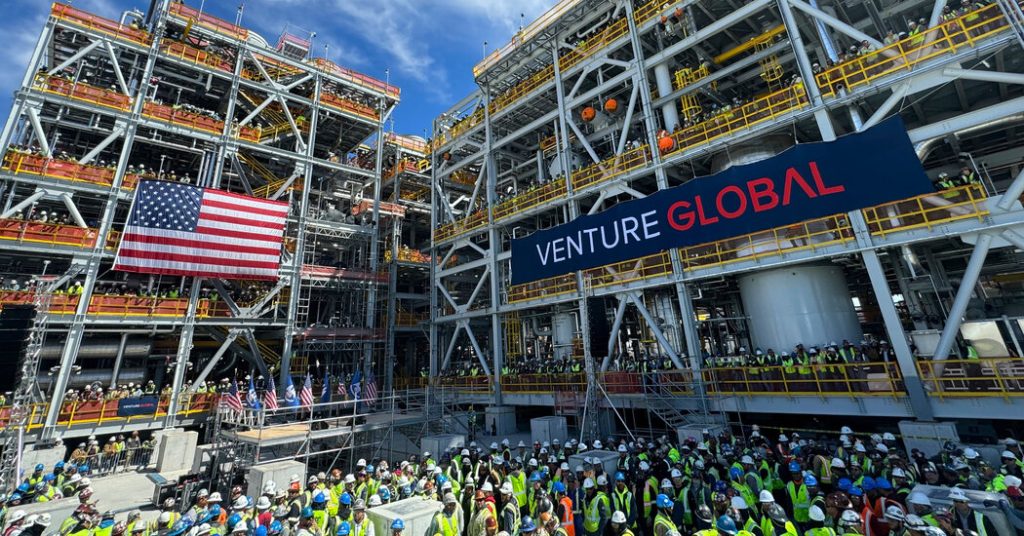The Trump Administration’s Fossil Fuel Push and the Global Response
President Trump’s administration has been actively dismantling regulations to accelerate the production and extraction of fossil fuels. This push has positioned the United States as a dominant player in the global energy market. However, the key question arises: who will be the buyers of this increased output? The answer lies in a geopolitical strategy where countries are purchasing American liquefied natural gas (LNG) not just for energy needs but also to navigate trade imbalances and avoid punitive tariffs. At an energy conference in Houston, executives revealed that nations are engaging in LNG deals with the U.S. to appease President Trump and maintain favorable trade relations. Meg O’Neill of Woodside Energy highlighted that countries with trade deficits are seeking ways to "level the playing field," with deals serving as a gesture to acknowledge U.S. concerns.
Global Deals and Geopolitical Motivations
Countries worldwide are expressing interest in American LNG, driven by both energy needs and geopolitical strategies. For instance, Japanese, Taiwanese, and Korean companies have revived a $44 billion project to export gas from Alaska to Asia, a venture once deemed financially impractical. Similarly, Ukraine aims to secure U.S. support by committing to American gas purchases. South Africa is negotiating expanded drilling rights for U.S. companies in exchange for aid resumption. India, a rapidly growing gas market, is considering stakes in U.S. LNG plants or long-term supply contracts. These deals reflect a broader European and Asian strategy to align with U.S. trade policies through energy purchases.
Energy Transition and Climate Concerns
While LNG is often marketed as a cleaner alternative to coal and oil, its role in climate change remains significant. Methane, a potent greenhouse gas, is a primary component of natural gas, and its emissions are rising with the industry’s growth. The U.S. is becoming a major player in global LNG trade, complicating efforts to meet carbon neutrality goals. Sultan al Jaber of Abu Dhabi National Oil Company, who previously led climate negotiations, emphasized the need for "transitional fuels" like gas, aligning with the U.A.E.’s stance. Despite global pledges to reduce fossil fuel reliance, investments in LNG infrastructure may hinder progress toward cleaner energy sources.
Energy Secretary’s Perspective and Investor Concerns
New U.S. Energy Secretary Chris Wright, a former fracking executive, has been addressing investor concerns about the reliability of U.S. LNG exports. He assured prospective buyers in Europe and Asia that America would remain a stable supplier, despite past regulatory pauses. However, the long-term nature of LNG contracts, often spanning decades, poses challenges for nations aiming to transition to renewable energy. Xi Nan of Rystad Energy notes that while LNG demand forecasts remain steady, renewable energy growth is slower than expected, delaying the energy transition.
Impact on Climate Goals
Expanding LNG trade conflicts with global climate objectives.Although gas emits less CO2 than coal or oil, methane’s potent impact means increased production contributes significantly to greenhouse gases. The U.S., as a major LNG exporter, faces criticism for prioritizing fossil fuel expansion over climate leadership. Countries signing long-term LNG contracts risk undermining their own carbon reduction targets, highlighting the tension between immediate energy security and long-term environmental sustainability.
Balancing Geopolitical and Environmental Interests
In conclusion, the surge in U.S. LNG exports underscores a complex interplay of geopolitics, energy security, and climate concerns. While these deals strengthen ties and balance trade, they jeopardize global efforts to combat climate change. As nations navigate energy transitions, the reliance on fossil fuels poses a significant challenge to achieving carbon neutrality. The path ahead requires weighing the benefits of geopolitical stability against the urgent need for environmental action, making for a fraught and critical decision-making landscape.


